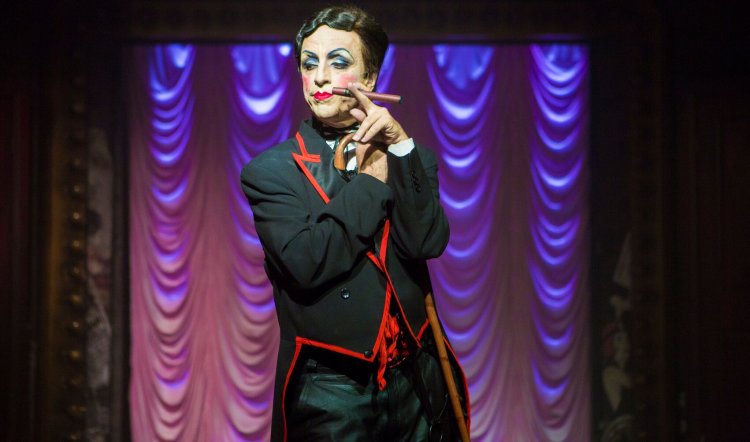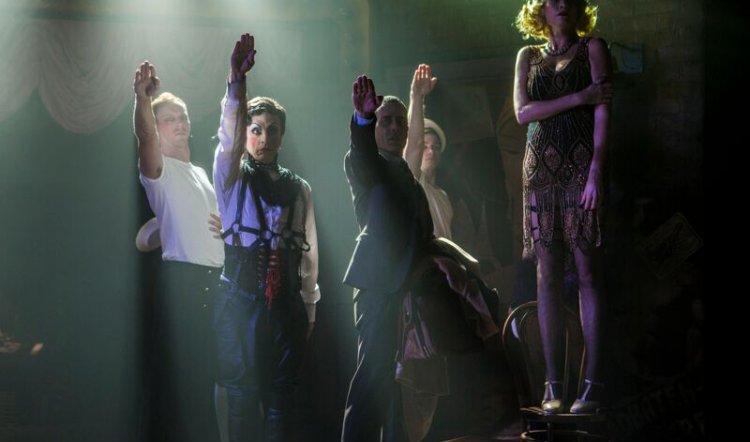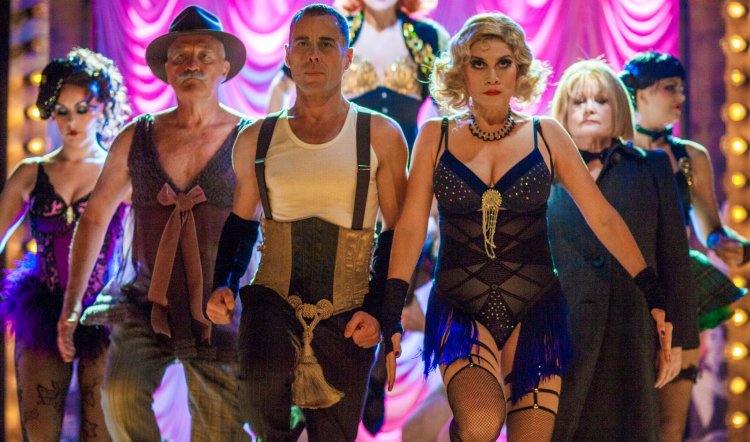
CABARET
CABARET, Hayes Theatre Co at the Hayes Theatre, from 9 January; Athenaeum Theatre, Melbourne from 27 April 2017. Photography by John McRae: above Paul Capsis; below – the company x 2
Thrilling!
The opening moments of this new production of the Broadway musical that first saw footlights in 1966 conjure up one word: thrilling. From the beginning it is brilliantly realised in the smartest, sharpest, wittiest choreography by Kelly Abbey; and direction by Nicholas Christo. The performances from the company of eleven singer-dancer-actors are emotion-charged yet fully under control and the result is joyous. Tragic too.
As the US descends into fascism under its new federal government and our own kowtows in business-as-usual, Cabaret is terrifyingly apposite. It’s set in 1930s Berlin in the declining years of the Weimar Republic when nationalism and intolerance were on the rise and Hitler’s march to power was underway. Nevertheless, most reasonable people couldn’t believe it and he and his Brown Shirts were still figures of derision. If Saturday Night Live had been around then Alec Baldwin would have been wearing a toothbrush moustache rather than a dead cat wig.
Young Englishman Christopher Isherwood went to Berlin seeking inspiration and himself. Cabaret is famously based on stories from the ensuing novel, Goodbye to Berlin. In it are the characters that were extracted for first, a stage play (I Am A Camera) and then the musical with music by John Kander, lyrics by Fred Ebb and book by John Masteroff.
Into the decadent city stumbles Isherwood’s alter ego Cliff Bradshaw (Jason Kos), whose baggage includes an uncertain sexuality and a Remington portable typewriter. He comes via a “chance” meeting on a train with Ernst Ludwig (Marcus Graham) whose enthusiastic “friendliness” takes Cliff to a cheap boarding house run by the genteel Fraulein Schneider (Kate Fitzpatrick).

Cliff’s education continues apace as he meets third-rate cabaret singer Sally Bowles (Chelsea Gibb) and another of Fraulein Schneider’s tenants, Fraulein Kost (Debora Krizak), who has many dubious visitors, mostly young men in uniform. The audience also learns something of life at the rough end of 1933 Berlin through Herr Schultz (John O’May) whose fruit shop is the source of scarce treasures such as an Italian-grown orange. So, when Sally drags Cliff off to the Kit Kat Club it doesn’t take the bemused and bedazzled novelist/Isherwood long to work out he’s no longer in Wyberslegh Hall...
Through production designer James Browne, lighting designer Rob Sowinski and sound designers Nick Walker and Andrew Worboys, the tiny Hayes Theatre has been transformed into the seamy, dingy, exciting Kit Kat Club, a nitery that had no great days to look back on. Its customers and inhabitants are epitomised by The Emcee (Paul Capsis) whose tawdry glamour is as knowing as he is tough, rough and without sentiment.
Cabaret is the Kander and Ebb masterpiece and the songs are unforgettable, and not just because Liza Minnelli and Joel Grey sang them all the way to eight Oscars in 1972. On the media opening night Ellie Shearer’s trombone led the orchestra (which is of course beeeyooodiful) in powerful and authentic renditions of such roof-lifters as “Wilkommen”, “Cabaret” and “The Money Song”; and musical director and pianist Lindsay Partridge modulated the band for such touching and delicate songs as “It Couldn’t Please Me More”, “Don’t Go” and “Married”. In between and vital to the arc of the story, the ensemble is weirdly militarised to accompany young Brownshirt, Rudy (Matthew Manahan), as he stirs horror in a rousing “Tomorrow Belongs To Me”.
The sad anger of “So What” is Kate Fitzpatrick’s first scene-steal, while the worldweary sorrow of Paul Capsis’s take on “I Don’t Care Much” is a heartbreaker. He generates a fresh lump-in-throat moment that began with Debora Krizak’s bitterly ironic reprise of “Tomorrow Belongs To Me”. Meanwhile Chelsea Gibb is daffy and gorgeous as Sally Bowles and raises the rafters with a full-blooded rip through the title song.
The relationship that builds between Sally and Cliff is plausibly and sweetly implausible and counter-balanced by an equally hopeful yet doomed romance between Fraulein Schneider and Herr Schultz. The impending catastrophe of Nazi dominion is signalled through chilling small moments – the casual reveal of Ernst Ludwig’s swastika armband and his instant transformation from affable to menace; the presence at every turn of grim-faced young men in uniform. And all the while ordinary, decent and not-so-decent folk go about their business and pretend it’s not happening.

Altogether it’s a superb production, held together but – properly – not dominated by Paul Capsis. None of the actors set out to make you like them and that’s just how it should be and so rarely is. They are all stand-outs in their different ways, including Nick Jones, Michelle Barr and Michelle Smitheram in the demanding and fully-realised supporting roles. If I’d had my druthers, however, I’d have cast Sally and Fraulein Kost the other way around to capitalise on Gibbs’s brittle beauty and Krizak’s unquenchable dazzle factor.
This Cabaret is harsh, truthful and without a trace of Hollywood sugar. It’s also funny, uplifting, tragic and all too probable – that the moral abyss over which millions said “never again” is opening up once more.
If you can get a ticket: do it now. If not, go to Melbourne. Otherwise, let’s hope that like the previous Hayes big hit Sweet Charity, it’s brought back to Sydney later this year. (Hint: you could start lobbying producer David M Hawkins today.)



